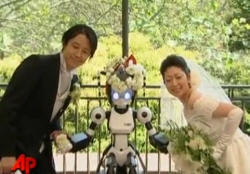
Mashable has this little story and video of a couple in Japan getting married in a ceremony performed by a robot. Looks like it went off without a hitch. But it’s an interesting harbinger of some of the legal questions that will arise as intelligence based on nonbiological substrates gets more human-like.
Is a marriage ceremony performed by a robot “legal”?
I looked up the Illinois statute that provides the requirements for a marriage ceremony (750 ILCS 5/209). A couple can get married if the marriage is “solemnized” by a judge, a county clerk, or “in accordance with the prescriptions of any religious denomination, Indian Nation or Tribe or Native Group, provided that when such prescriptions require an officiant, the officiant be in good standing with his religious denomination, Indian Nation or Tribe or Native Group.”
I expected the statute to be phrased in a way that would at least strongly imply that the ceremony has to be solemnized by a person. But I’m not sure it’s totally clear. I’m not a family lawyer — so take this with a grain of salt. It looks like a couple can still be validly married in a religious ceremony if the “prescriptions” of that religion do not require an officiant.
So it may not be too hard to work around the robot problem. Just find a church out there to establish some prescriptions that don’t make the officiant an essential part. Then the robot ceremony could ostensibly be a side show, like the cutting of the cake or tossing of the bouquet.
If you think about it, does it really matter whether the officiant is a person? There remains the obligation to get a license, which serves as a vetting process of sorts for the couple. And the psychological effect of “solemnization” is to get the couple to take it seriously. Does anyone care whether the officiant is conscious of what’s going on in the same way a human would?

May 18, 2010
It’s simpler than that.
Have a residence that recognizes Common Law Marriage.
you don’t even need the robot.
per Wiki
“Common-law marriage is still valid in 13 states (Alabama, Colorado, Georgia, Idaho [only if before 1-1-96], Iowa, Kansas, Montana, Ohio [only if before 10-10-91], Oklahoma, Pennsylvania [only if before 01-01-2005], Rhode Island, South Carolina, North Carolina and Texas) and the District of Columbia”
May 21, 2010
That was in Japan, right? What are their legal requirements for a valid marriage?
May 23, 2010
I think of the officiant as performing a function similar to the jury in a courtroom–the last piece of protection against an injustice. If the officiant is not convinced of that the couple should marry (age of consent, voluntary, absence of fraud, etc.) then he would not go through with the ceremony. A robot would be incapable of fulfilling this duty.
I’m not surprised that the law doesn’t require the officiant to be human as the writers of the law probably did not anticipate that it might be other than human. As for my conception of the officiant’s responsibility, I’m a little surprised that it is not mentioned in statutory law, but I would be more surprised if it is not reflected in the common law either.
June 11, 2010
Your question brings to mind the centuries-old question of whether commmited “Friends” (Quakers) (whose religion prohibits “officiants” of any kind) can get married at all. George Fox (founder of the Society of Friends) wrote an epistle on this topic around 1653.
Can “Friends” be married by a robot?